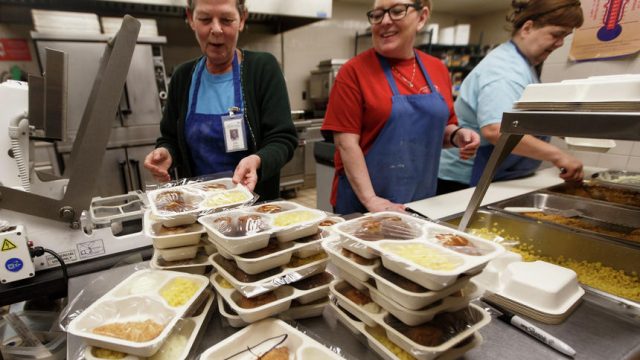The State of North Dakota Is Not Putting Meals on Wheels Funding “At Risk”

Liz Lindquist, left, Julie Kamrowski and Gerri Davis form an assembly line as they get the meals prepared for delivery on Wednesday, March 22, 2017 in Grand Forks, N.D. Davis', the kitchen manager for fifteen years, day starts at 6am getting the meals started. Assembling, sealing and boxing up the meals for the drivers takes around a half hour for the number of routes they currently have. (Jesse Trelstad/Grand Forks Herald)
“Meals on Wheels funds at risk with ND bill and Trump budget,” reads a recent headline.
That’s an unfortunate headline though it does make for a nice talking point for the state’s liberals, who have been crowing about this online and tying the situation to similarly exaggerated claims about President Donald Trump’s budget.
.@NDHouseDemNPL is fighting to protect Meals on Wheels, which is necessary for seniors, rural communities. #ndpol https://t.co/61BqGoDCLc pic.twitter.com/ub7yFlLUYa
— ND Dem-NPL (@nddemnpl) March 23, 2017
The problem? It’s not reality. From the body of the article under the aforementioned headline:
A proposed amendment to a North Dakota Senate bill limiting matching funds to senior citizen services has some, including Grand Forks Senior Center staff, worried Meals on Wheels programs across the state could be at risk, especially considering President Donald Trump’s budget cut proposals.
The proposal would cap the matching grants from the state’s senior citizen services and programs fund at $3.5 million annually, roughly the same as the $3,493,688 the state paid to counties this year, according to figures provided by the North Dakota Treasurer’s Office. State matching funds have grown steadily over the past decade, from just less than $1 million paid in 2006 to the almost $3.5 million paid in 2017.
The Office of the State Tax Commissioner predicts the state would pay more than $3.9 million next year in matching funds, based on last year’s tax figures. Rep. Kathy Hogan, D-Fargo, said that would roughly amount to a $400,000 cut, and she worried a cap wouldn’t account for program growth.
That’s not a cut. That’s a pause in spending growth.
“There is no reduction in the program,” Rep. Craig Headland (R-Montpelier), who submitted the amendment, told the authors of the article. “We have to look at all areas of government that have these automatic increases that are really out of our hands.”
A reduction in the rate of growth in spending on a government program is not a cut.
As the article notes, this amendment would cap spending on this program at $3.5 million, which is just slightly more than what the program is getting currently.
There is no funding “at risk.” Implying that the funding is at risk is like saying you’re on a diet because you’re not eating food you already weren’t eating.
This sort of rank politicking, and emotionally-driven nonsense, is why meaningful budget reform is almost impossible at the state level and literally impossible nationally.




